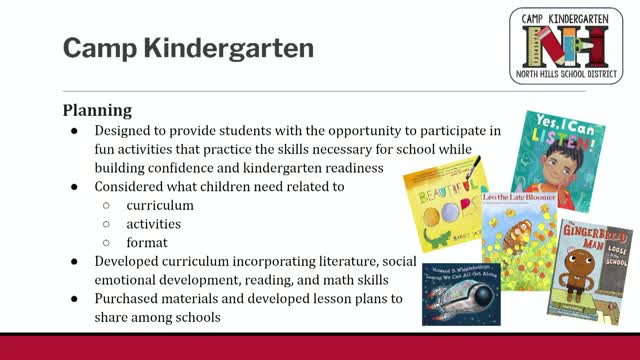Camp Kindergarten Transforms Student Readiness and Confidence
October 18, 2024 | North Hills SD, School Districts, Pennsylvania
This article was created by AI summarizing key points discussed. AI makes mistakes, so for full details and context, please refer to the video of the full meeting. Please report any errors so we can fix them. Report an error »

In a recent government meeting, educators discussed the successful implementation of a summer camp program aimed at easing the transition for incoming kindergarten students. The initiative, dubbed \"Camp Kindergarten,\" invited students from various backgrounds, including those in early intervention programs and English language learners, to participate in a structured environment designed to prepare them for the school year.
Out of 200 invitations sent, 57 students attended the camp, representing approximately 40% of those invited and 20% of the total kindergarten class. The program included a parent orientation, allowing families to meet teachers and understand the curriculum, which was tailored to accommodate students with special needs and language barriers.
Feedback from parents was overwhelmingly positive, with many expressing a desire for the program to be extended. Parents noted that their children enjoyed the school tours and making new friends, while the structured environment helped alleviate anxiety about starting school. Teachers reported a noticeable decrease in separation anxiety among students on their first day of kindergarten, a significant improvement compared to previous years.
The camp also focused on developing essential school readiness skills, such as patience, self-care, and emotional regulation. Educators observed that students demonstrated increased independence and confidence, with many able to navigate their school environment effectively. Assessments conducted at the end of the program indicated academic growth, particularly in letter recognition and phonetic awareness.
Overall, the meeting highlighted the positive impact of Camp Kindergarten on both students and parents, with educators emphasizing the importance of such programs in fostering a smooth transition into formal education. The initiative not only prepared children academically but also equipped them with the social and emotional skills necessary for success in school.
Out of 200 invitations sent, 57 students attended the camp, representing approximately 40% of those invited and 20% of the total kindergarten class. The program included a parent orientation, allowing families to meet teachers and understand the curriculum, which was tailored to accommodate students with special needs and language barriers.
Feedback from parents was overwhelmingly positive, with many expressing a desire for the program to be extended. Parents noted that their children enjoyed the school tours and making new friends, while the structured environment helped alleviate anxiety about starting school. Teachers reported a noticeable decrease in separation anxiety among students on their first day of kindergarten, a significant improvement compared to previous years.
The camp also focused on developing essential school readiness skills, such as patience, self-care, and emotional regulation. Educators observed that students demonstrated increased independence and confidence, with many able to navigate their school environment effectively. Assessments conducted at the end of the program indicated academic growth, particularly in letter recognition and phonetic awareness.
Overall, the meeting highlighted the positive impact of Camp Kindergarten on both students and parents, with educators emphasizing the importance of such programs in fostering a smooth transition into formal education. The initiative not only prepared children academically but also equipped them with the social and emotional skills necessary for success in school.
View the Full Meeting & All Its Details
This article offers just a summary. Unlock complete video, transcripts, and insights as a Founder Member.
✓
Watch full, unedited meeting videos
✓
Search every word spoken in unlimited transcripts
✓
AI summaries & real-time alerts (all government levels)
✓
Permanent access to expanding government content
30-day money-back guarantee
